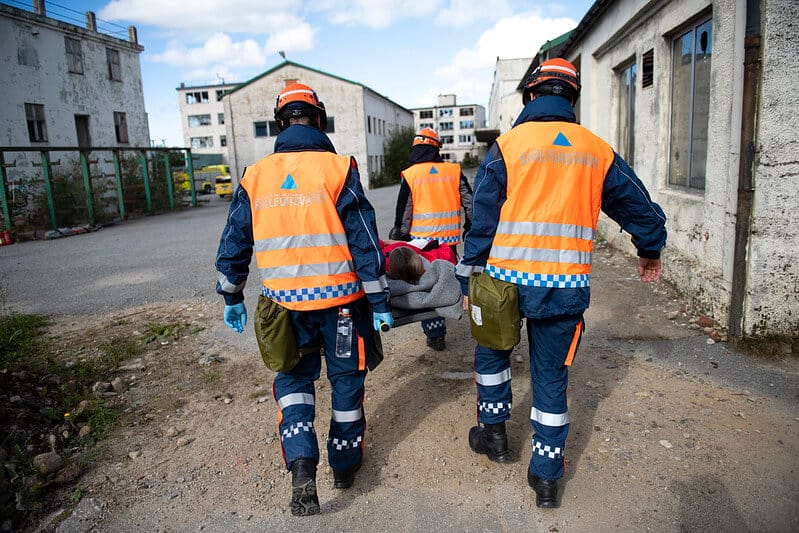Nyheter
Les siste nytt fra Proactima her.
Category: Proactima believes
Norway is not prepared for the management of tomorrow’s risksThe current organization, structures and systems in our national civil protection, emergency preparedness and crisis management work is not suited for managing tomorrow’s risks, Trond Winther and Ivar Lunde claim in this opinion piece.
We live in an uncertain and vulnerable time. Our everyday lives are characterized by financial insecurity. Society is constantly subjected to cyberattacks, and artificial intelligence is changing the world. This summer, our country was cut in half by flooding and landslides, and extreme weather conditions are becoming increasingly common. We experienced an attack on the energy supply in close proximity to us, and critical infrastructure is overloaded. There is war in Europe, and Norwegians are being evacuated from the Middle East.
Increased expectations
We, as citizens, depend on the ability of public authorities to prevent and handle serious unwanted incidents and crises. Society must show a willingness to assume clear responsibility for its most important task – to uphold safety and security, even into an uncertain future.
The 16th of October was the deadline for comments for the Total Preparedness Commission’s report “This is serious.” The Commission proposes that the Ministry of Justice and Public Security should be made responsible for the coordination of crisis management at the national level. At the regional and local levels, the Commission recommends that the County Emergency Preparedness Councils be maintained and that municipal emergency preparedness councils be established by regulation. The proposed council structure has, in actuality, existed for decades and is outdated. The future we have to prepare for, requires that we think outside the box. It is naïve to believe that more of the same will generate new ideas and yield better results.
Read more: Proactima’s response to the Total Preparedness Commission

Lack of ability
The Commission’s proposed council structure has limited true influence on the preventative civil protection work and lacks the necessary emergency preparedness and crisis management ability. This structure and system is not suitable for society’s complexity and the rate at which we communicate and provide information now. The existing organizational structure means that actors do not interact effectively enough and that efforts come both too late and with inadequate resources.
During both the refugee crisis and the pandemic, we saw how municipalities and the private sector initially had to handle the situation on their own, with no national guidance or control. When national guidelines eventually did come, they were often inadequate or conflicting. At the same time, the national level, on several occasions, bypassed the ordinary lines of communication and contacted the local level directly, because the flow of communication was too slow. This is a sign of disease in a system that must be functional quickly and effectively when things are urgent and every second counts.
Solutions of the future
New tools, sources of information and means of communication that could make prevention, emergency preparedness and crisis management more effective, are constantly becoming available. To take full advantage of these tools requires knowledge, expertise and professionalism. Civil protection, emergency preparedness and crisis management can no longer be relegated to part-time positions at the municipal, regional or national level.
For the future, it is important that we work comprehensively and systematically with prevention, emergency preparedness and crisis management over time.
Only with expertise, capacity and true resource production at an operational level is it possible to face the complex threats of the future in a responsible manner.
Units equivalent to the Civil Protection House in the City of Bergen is an example of alternative organization. With similar units in recently established civil protection regions, localized in larger cities/regional hubs, regional, operational cooperative centres can establish continuous coordination arenas with the necessary expertise. The proposed council structure can be maintained as an advisory body at a strategic level.
At the national level, a national civil protection coordination centre must be established, based on the principles behind the Civil Protection House, and the regional centres can continuously report here. This way, we can have a structure and a system that effectively can:
1. maintain the necessary situational understanding and develop situational awareness for decision-makers through continuous monitoring of the dynamic risk picture, and
2. have the operative ability to: a) identify hazard and threat events early enough to prevent these from developing into serious unwanted incidents, and respond early and effectively with sufficient resources to minimize suffering and the consequences of incidents that do occur.
The civil protection regions can consist of one or more counties and include all municipalities in the region. This way, local and regional authorities, emergency services, infrastructure owners, the private sector and volunteers can work together effectively in the same regional coordination arena.
It is urgent. It is essential that we establish robust civil protection regions with the competence, capacity and professionalism to work comprehensively and systematically with the region’s civil protection issues in close collaboration with the public and private sectors and volunteer organizations, continuously and over time.
—
Trond Winther has extensive experience with managing large risk management projects, both here in Norway and abroad. He has been an executive in the consulting industry for many years, and since 2018, he has been CEO of Proactima AS.
Ivar Konrad Lunde has a background from the Armed Forces and the police. He has been the Head of Emergency Preparedness for the City of Bergen and the Director of the Civil Protection House. As author of the popular textbook “Praktisk krise- og beredskapsledelse”, Universitetsforlaget, 2019, he teaches at universities and university coleges, and he has a part-time position as an assistant professor at Nord University.
